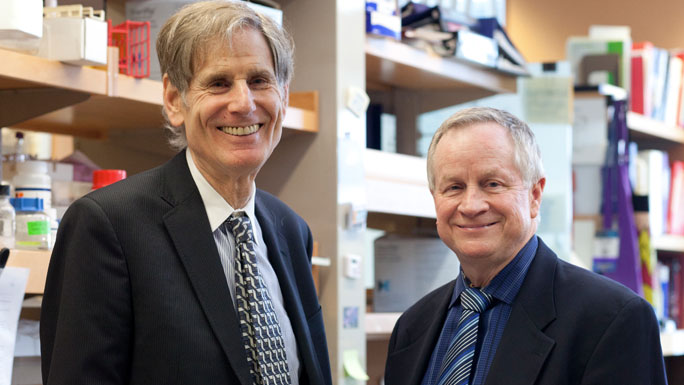Metastasis

The deadliest aspect of cancer is metastasis — a process by which tumor cells break away from their neighbors and travel to distant organs. Metastatic cancer remains a major clinical challenge due to lack of accurate predictive tests and limited effective therapeutic options. This translates into lower survival rates at later stages of the disease. Our researchers are invested in unraveling the molecular and genetic basis of this process, a key to developing successful treatments tailored to individual patients that will prevent cancer from spreading.
Back in 1995, Ralph Weichselbaum, MD, and Samuel Hellman, MD, coined the phrase “oligometastasis” to describe a state in which patients have a few metastases, or sites of cancer that has spread, in contrast to those with widespread metastases throughout the body. Since then, Weichselbaum and his colleagues have not only learned how to treat these patients with oligometastases effectively, but have also led efforts to understand the differences between these metastatic states and the molecular mechanisms that are involved.
Work from Weichselbaum and other Comprehensive Cancer Center members Sean Pitroda, MD; Mitchell Posner, MD; Kevin White, PhD; and Jeremy Segal, MD, PhD, identified three distinct subtypes of de novo colorectal liver metastasis through integrative molecular analysis (Pitroda et al., Nat Comm 9:1793-1801, 2018). These molecular subtypes complement clinical information to distinguish low-, moderate-, and high-risk patients with very different survival rates, and have the potential to change how we evaluate metastasis clinically.
The Ludwig Center for Metastasis Research brings together researchers from various areas of expertise, including molecular and cell biology, bioinformatics, chemistry, genetics, imaging and medicine to dissect the basic mechanisms of metastasis using sophisticated, state-of-the-art approaches. Ultimately, the center aims to further our understanding of what fundamentally controls cancer’s deadly spread and translate laboratory concepts to novel therapeutics to treat and prevent metastasis.
The center, co-directed by Geoffrey Greene, PhD, and Ralph Weichselbaum, MD, supports investigators through a Pilot and Team Science Grant Program. The Ludwig Center for Metastasis Research was one of six centers (the others at Dana-Farber/Harvard University, Johns Hopkins University, Massachusetts Institute of Technology, Memorial Sloan-Kettering Cancer Center and Stanford University) established by a $120 million gift from Ludwig Cancer Research in 2006 and subsequent $90 million gift to each institution in 2014, and is the only one dedicated to metastasis research.
Kay Macleod, PhD, associate professor in the Ben May Department for Cancer Research, and a team that included Gregory Karczmar, PhD, professor of radiology, discovered that when mitochondria (the cell’s powerhouses) become dysfunctional, breast cancer is more likely to metastasize, or spread to other areas of the body.
In ongoing studies, Macleod and her team are investigating the significance of changes in mitochondrial mass for tumor treatment responses and in order to predict which tumors are likely to progress to metastasis.
Read more on the Science Life blog
Ernst Lengyel, MD, PhD, studies the biology of how ovarian cancer spreads to other sites and the use of novel drugs for its treatment. His laboratory was the first to culture metastatic ovarian cancer cells in a three-dimensional environment, similar to how these cells would grow in the body, and the first to use high-throughput drug screening in this model.
Learn more about Dr. Lengyel's research
Xiaoyang Wu, PhD, received a grant from the Janet D. Rowley Discovery Fund to work on understanding the mechanisms that control tumor cell migration, a central step in metastasis.
The Metastasis Working Group meets monthly to share work-in-progress research updates and new ideas in scientific areas related to metastasis. The meetings, involving faculty, students, fellows and staff, foster collaboration and resource sharing.
